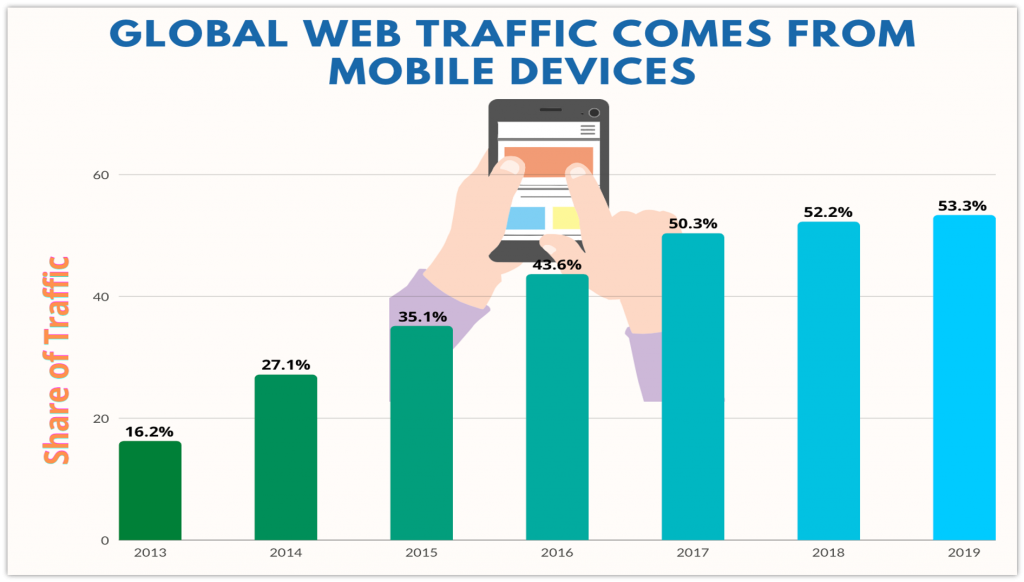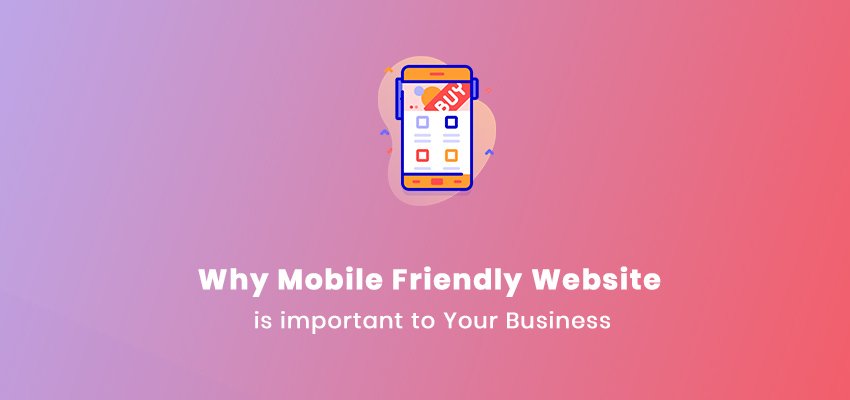Internet users are now more active on mobile devices. According to a survey, over 70% of users will use their mobile devices to access the internet by 2025. So if you have a business website but you have not built its mobile version yet, you should build it today. Because if your website does not have a mobile version, you cannot target mobile users. Your user experience is going to suffer. Moreover, Google does not like those websites that are not optimized for mobile devices. So there is no point to have a website without its mobile version. In this article, we are going to discuss the importance of a mobile friendly website.
What if your site is not mobile-friendly…
Have you ever thought about how your website’s user experience is going to be without a mobile version? Since most of the Google searches come from mobile devices, if your site is not mobile-friendly, you make mobile users unhappy. If your site is not optimized for mobile devices, it fails to impress mobile users. When they visit your website, they may not find the information easy-to-read. The entire web design seems to be non-responsive. They have to slide all over the screen, and zoom in & zoom out to make the information readable on their mobile devices. This will not be an enjoyable experience for your mobile users.
As a result, they will leave your website immediately, and visit a mobile friendly website where they can easily find the information they want. They will never visit your website again.
When a user instantly leaves your site, this will not only degrade the user experience but also increase the bounce rate for your website. Remember, websites with a high bounce rate do not perform well. Besides, Google likes a mobile friendly website and rewards it with a higher search ranking. It does not rank your website if it is not optimized for mobile devices. So it is not a good idea to have a website without its mobile version. Before we can learn how to build a responsive website, let’s discuss the importance of a mobile friendly website.
Importance of Mobile Friendly Website
Mobile friendly websites are just like normal websites, but they are designed in such a way that they can be viewed on mobile devices perfectly. These days people often use their smartphones to access information online. The below stat will show you the global web traffic that comes from mobile devices. The number is constantly growing every year. So overall, it is good to have a mobile friendly website. You can reach a wider audience and create a large customer base.

If you are creating a new website, you should definitely create its mobile version as well. Even if you have an existing website, you should make it mobile-friendly today. Because there are many advantages of a mobile friendly website for your business, such as –
#1 – Boost Brand Credibility
Having a mobile friendly website will help you boost your brand credibility. How? Your brand’s credibility depends on whether people trust you or not. If you keep your audience happy, you will gain their trust. If your business website is optimized for mobile devices, it will make a positive impact on users, especially on those who access your website through a mobile device. With a mobile friendly website, you can show the world that you understand your customers’ needs. When people are happy and they trust you, this will increase your brand credibility for sure.
#2 – Attract More Customers
If your website does not have a mobile version, you can only target those customers who use PC or laptops to access your site. But what about mobile users? As we know, a large number of users use mobile devices to access the internet, you can bring all those customers to your website. All you need to do is optimize your site for mobile devices, i.e. smartphones and tablets. With a mobile friendly website, you can reach a wider audience.
#3 – Improve User Experience
We all know that user experience is very important for any website. The growth of your website majorly depends on the user experience. If the users are happy, your website will grow. But if they are unhappy, your website will suffer. With a mobile friendly website, you can improve the user experience. How? Let’s suppose you build a mobile friendly website. Now when mobile users come to your site, they can easily view/read all the information irrespective of the screen size of their mobile device. They will like your site and spend more time on it. This will improve the user experience of your website.
#4 – Reduce Bounce Rate
One of the best and most effective ways to reduce the bounce rate is by optimizing your site for mobile devices. Websites that are not mobile friendly have a higher bounce rate compared to mobile friendly websites. Why? When mobile users visit those websites, they instantly bounce back to a mobile friendly website. If a website is not optimized for mobile devices, mobile users will find it difficult to access the site and read or view the content. This will increase the bounce rate. With a mobile friendly website, you can keep your mobile users engaged. They will spend more time on your website, and this will reduce your bounce rate.
#5 – Improve Google Search Ranking
Google has included mobile-friendliness as a ranking factor. A mobile friendly website gets a higher search ranking compared to those websites that are not friendly for mobile devices. If you optimize your website for mobile devices, Google will appreciate your effort by rewarding you with a higher search ranking. Your website will show on top of the search results and get more traffic.
Refer to this article for some useful information – How to Improve Google Search Ranking of Your Website.
Conclusion
Everyone who has a business website wants to optimize it for mobile devices. And why not, a mobile friendly website can improve your search visibility and enhance your brand identity. In this article, we have discussed the benefits of optimizing your business website for mobile devices.
So what are you waiting for? Build your mobile responsive website today and give your customers the most amazing user experience.
